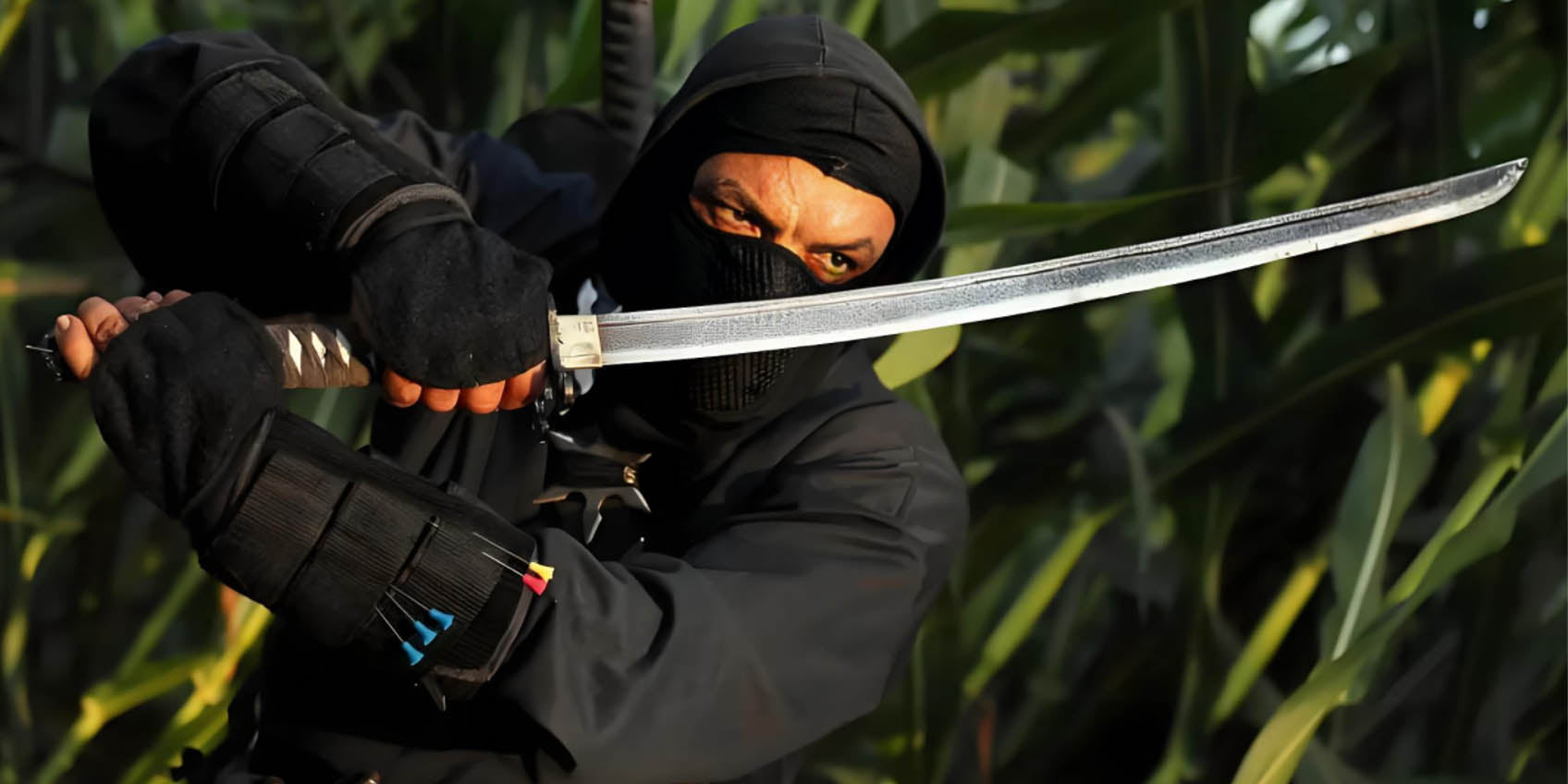วิวัฒนาการของดาบนินจา: จากประเพณีสู่เทคโนโลยีสมัยใหม่

ดาบนินจา หรือที่เรียกอีกอย่างว่า นินจาโตะ (忍刀) เป็นอาวุธเฉพาะตัวที่นินจาใช้ตลอดประวัติศาสตร์ญี่ปุ่น เมื่อเปรียบเทียบกับ ดาบซามูไร (เช่น ดาบคาตานะ และ ดาบวากิซาชิ ) การออกแบบของนินจาโตะจะเน้นที่การลอบเร้นและความสามารถในการใช้งานจริง บทความนี้จะเจาะลึกถึงวิวัฒนาการทางประวัติศาสตร์ของนินจาโตะ และอิทธิพลของเทคโนโลยีสมัยใหม่ต่อการประดิษฐ์และการนำอาวุธดั้งเดิมนี้ไปใช้อย่างไร
ความแตกต่างระหว่างดาบนินจาโตะและดาบซามูไร
ดาบนินจาโตะและ ดาบซามูไร ถือเป็นดาบสองชนิดที่เป็นสัญลักษณ์ของวัฒนธรรมอาวุธญี่ปุ่น แต่มีความแตกต่างกันอย่างมากในด้านการออกแบบ ฟังก์ชัน และสถานการณ์การใช้งาน
1. ความยาวและรูปร่างของใบมีด
นินจาโตะโดยทั่วไปจะมีใบดาบสั้น โดยมีความยาวประมาณ 24 นิ้ว (ประมาณ 60.96 ซม.) โดยมีการออกแบบใบดาบให้ตรง ทำให้นินจาโตะเหมาะสำหรับใช้ในพื้นที่แคบๆ เพื่อให้สามารถโจมตีได้อย่างรวดเร็วและแอบซ่อนได้ ในทางตรงกันข้าม ดาบซามูไร มักจะมีใบดาบยาวกว่า 3 ฟุต (ประมาณ 90 ซม.) มีส่วนโค้งที่ชัดเจน ขอบคม และออกแบบมาเพื่อการเผชิญหน้าโดยตรงและการเคลื่อนไหวฟันที่ต้องใช้กำลังมาก
2. วัสดุและฝีมือการประดิษฐ์
แม้ว่าทั้งสองอย่างจะผลิตจาก เหล็กกล้าคาร์บอนสูง แต่ฝีมือการประดิษฐ์ ดาบซามูไร นั้นซับซ้อนกว่า โดยมักจะใช้เหล็กหลายประเภทที่หลอมรวมกันผ่านกระบวนการอบชุบและอบชุบที่เข้มงวดเพื่อให้ได้ความสมดุลที่ดีที่สุดระหว่างความแข็งและความยืดหยุ่น การประดิษฐ์ดาบนินจาโตะนั้นค่อนข้างง่ายกว่า โดยเน้นที่การใช้งานจริงและการปกปิดมากกว่า โดยดาบมักจะมีความคมน้อยกว่า ดาบซามูไร
3. วัตถุประสงค์และกลยุทธ์
นินจาโตะส่วนใหญ่มักใช้ในปฏิบัติการลอบเร้นและโจมตีแบบกะทันหัน โดยดาบจะทื่อเล็กน้อยและออกแบบมาเพื่อการแทงมากกว่าการฟัน ในทางกลับกัน ดาบซามูไร เป็นสัญลักษณ์ของซามูไรและส่วนใหญ่ใช้ในการต่อสู้และเกียรติยศ โดยมีคมที่เหมาะสำหรับการเผชิญหน้าโดยตรงและการฟัน
4. ความสำคัญทางวัฒนธรรม
ในวัฒนธรรมญี่ปุ่น ดาบซามูไร ไม่เพียงแต่เป็นสัญลักษณ์ของอาวุธเท่านั้น แต่ยังเป็นสัญลักษณ์ของจิตวิญญาณและเกียรติยศของซามูไรอีกด้วย โดยเน้นย้ำถึงความภักดีและความกล้าหาญ อย่างไรก็ตาม นินจาโตะมีความเกี่ยวพันอย่างใกล้ชิดกับวัฒนธรรมนินจาที่ลึกลับ แสดงถึงความลับและไหวพริบ ซึ่งสะท้อนถึงสถานะอันเป็นเอกลักษณ์ของนินจาในประวัติศาสตร์
การออกแบบแบบดั้งเดิมของ Ninjato
ลักษณะเฉพาะของนินจาโตะ ได้แก่ ใบดาบที่สั้นกว่า โดยทั่วไปจะมีความยาวประมาณ 24 นิ้ว (ประมาณ 60.96 ซม.) มักมีขอบตรงและการ์ดสี่เหลี่ยม เมื่อเปรียบเทียบกับ ดาบซามูไร นินจาโตะโดยทั่วไปมีคุณภาพและความคมที่ต่ำกว่า โดยส่วนใหญ่ใช้สำหรับการแทงมากกว่าการหั่น การออกแบบนี้ทำให้พวกนินจาเสียเปรียบในการเผชิญหน้าโดยตรง เนื่องจากพวกเขาต้องอาศัยกลวิธีลอบเร้นและกลยุทธ์ที่ชาญฉลาดจึงจะประสบความสำเร็จ
ในอดีต นินจาจะปลอมตัวเป็นพลเมืองธรรมดาเพื่อหลีกเลี่ยงการถูกเจ้าหน้าที่จับได้ เพื่อเพิ่มความปกปิด อาวุธของพวกเขาจึงมักดัดแปลงมาจากเครื่องมือทำฟาร์มหรืออุปกรณ์ทำสวนทั่วไป ทำให้ดูเหมือนเป็นของธรรมดา นินจาโตะไม่เพียงแต่เป็นเครื่องมือต่อสู้เท่านั้น แต่ยังเป็นเครื่องมือเอาตัวรอด ช่วยให้นินจาลดความเสี่ยงในการถูกค้นพบขณะปฏิบัติภารกิจ
วิวัฒนาการของอาวุธสำคัญของนินจา
อาวุธของนินจามีความหลากหลาย โดยมีเครื่องมือของนินจาหลักๆ อยู่ 7 ประเภท:
-
ชูริเคน : ดาวกระจายชนิดหนึ่ง ใช้ในการโจมตีระยะไกล มักเคลือบด้วยพิษเพื่อเพิ่มพลังโจมตี
-
มากิบิซี : ตะปูทรงสี่เหลี่ยมข้าวหลามตัด ใช้สำหรับขัดขวางผู้ไล่ตามระหว่างหลบหนี โดยสามารถใช้วัตถุที่ไม่เรียบแทนได้
-
ซิโนบิกาตานะ : มีเชือกยาวประมาณ 3 เมตรไว้สำหรับปีนกำแพง และฝักดาบทำหน้าที่เป็นท่ออากาศในกรณีฉุกเฉิน
-
ฮูกิยะ : เข็มพิษที่ซ่อนอยู่ภายในขลุ่ย นินจาจำเป็นต้องมีทักษะการเล่นขลุ่ย
-
ไซโกมิดูเอ : ไม้เท้าที่ซ่อนโซ่ หอก หรือดาบไว้ ทำให้พกพาและใช้งานได้สะดวก
-
เทคโคกะ : กรงเล็บที่สามารถติดบนนิ้วมือหรือหลังมือเพื่อการต่อสู้ระยะประชิด
-
มิซูกุโม : อุปกรณ์พับสำหรับข้ามแม่น้ำ มักจะซ่อนไว้ในแพ็คเกจ
ผลกระทบของเทคโนโลยีสมัยใหม่ต่อนินจาโตะ
ปัจจุบัน งานฝีมือ Ninjato ไม่เพียงแต่ยังคงรักษาเทคนิคการประดิษฐ์ด้วยมือแบบดั้งเดิมไว้เท่านั้น แต่ยังผสานเทคโนโลยีขั้นสูงเข้าไป ด้วย เหล็กกล้าอัลลอยด์สมรรถนะสูง และเทคนิคการตีขึ้นรูปช่วยปรับปรุงความทนทานและความคมของ Ninjato ให้ดีขึ้นอย่างมาก นอกจากนี้ เทคโนโลยีการตัดด้วยเลเซอร์และ เครื่องจักร CNC ที่ทันสมัยยังช่วยให้รูปร่างและขอบของใบมีดแม่นยำยิ่งขึ้นอีกด้วย
นอกจากนี้ การออกแบบ Ninjato ในยุคปัจจุบันยังคำนึงถึงหลักสรีรศาสตร์เพื่อเพิ่มความสะดวกสบายและความปลอดภัยให้กับผู้ใช้ ผู้ผลิต Ninjato หลายรายยังเสนอบริการปรับแต่งโดยสร้างการออกแบบใบมีดเฉพาะตามความต้องการและสถานการณ์การใช้งานของแต่ละบุคคล
บทสรุป
นินจาโตะเป็นอาวุธที่มีประวัติศาสตร์ยาวนานและยังคงดึงดูดผู้ชื่นชอบได้แม้จะผ่านมาหลายศตวรรษแล้วก็ตาม การผสมผสานระหว่างงานฝีมือแบบดั้งเดิมและเทคโนโลยีสมัยใหม่ทำให้นินจาโตะมีฟังก์ชันการทำงานและประสิทธิภาพที่ดีขึ้นอย่างมาก ไม่ว่าจะเป็นอาวุธ ของสะสม หรือสัญลักษณ์ทางวัฒนธรรม นินจาโตะก็พัฒนาอย่างต่อเนื่องโดยยังคงรักษาเสน่ห์เฉพาะตัวเอาไว้ ด้วยความก้าวหน้าทางเทคโนโลยีอย่างต่อเนื่อง อนาคตของนินจาโตะจึงมีแนวโน้มว่าจะน่าตื่นเต้นยิ่งขึ้นไปอีก
ดาบนินจาญี่ปุ่นตีขึ้นมือ ใบมีดตรง เหล็กพับดามัสกัส นินจาโตะ อูโนคุบิ-ซุคุริ
ดาบนินจาญี่ปุ่นทำมือ โดย COOLKATANA โดดเด่นด้วยใบมีดตรง พับเหล็กดามัสกัส เผย ให้เห็นรูปร่างใบมีด Unokubi-Zukuri ที่เป็นเอกลักษณ์ เหมาะสำหรับการต่อสู้และการแสดงต่างๆ ดาบต่อสู้ Pojun นี้ทำจาก เหล็กสปริงที่มีความแข็งแรงสูง โดยใบมีดสามารถงอได้มากถึง 70 องศาโดยไม่เสียรูป แสดงให้เห็นถึงประสิทธิภาพและความทนทานที่เหนือชั้น
การออกแบบสีดำล้วนไม่เพียงแต่ให้ความสวยงามเชิงยุทธวิธีเท่านั้น แต่ยังทำให้เหมาะกับสภาพแวดล้อมต่างๆ อีกด้วย ดาบแต่ละเล่มได้รับการประดิษฐ์ด้วยมืออย่างพิถีพิถันและขัดเงาโดยช่างตีดาบผู้เชี่ยวชาญ โดยมี โครงสร้างแบบฟูลแทง และดีไซน์พร้อมรบซึ่งเพิ่มความทนทานในขณะที่รับประกันว่าทุกรายละเอียดจะไร้ที่ติ นอกจากนี้ ดาบเล่มนี้ยังมีบริการแกะสลักแบบกำหนดเองได้ฟรี ทำให้แต่ละชิ้นมีความเป็นเอกลักษณ์เฉพาะตัวและแสดงให้เห็นถึงลักษณะเฉพาะตัว
ดาบนินจาญี่ปุ่นที่ตีขึ้นด้วยมือ นี้ ประดิษฐ์จาก เหล็กพับดามัสกัส พร้อม ใบดาบตรง เพรียวบางตามแบบฉบับ นินจาโตะ อูโนคุบิ-ซุคุริ มอบทั้งความสวยงามตระการตาและประสิทธิภาพที่ยอดเยี่ยม กระบวนการพับที่ซับซ้อนทำให้ใบดาบมีลวดลายที่เป็นเอกลักษณ์และสวยงาม ในขณะที่ยังคงความคมและความทนทานสำหรับการใช้งานจริง
ดาบนินจารุ่นนี้ได้รับการออกแบบมาสำหรับผู้ที่ชื่นชอบและนักสะสม นินจา โดยผสมผสานระหว่างความสามารถในการลอบเร้นและความแม่นยำ ไม่ว่าคุณจะชื่นชอบ ชิโน บุ อุปกรณ์ นินจา หรือฝีมือการประดิษฐ์ ดาบนินจา ดาบเล่มนี้ผสมผสานระหว่างรูปลักษณ์และการใช้งานได้อย่างลงตัว การออกแบบ ใบมีดตรง พร้อมกับเทคนิคการตีเหล็กระดับผู้เชี่ยวชาญ ทำให้ดาบเล่มนี้ไม่เพียงแต่เป็นของประดับตกแต่งเท่านั้น แต่ยังเป็นอาวุธที่ใช้งานได้จริงอีกด้วย
ดาบดามัสกัส Ninjato นี้เหมาะอย่างยิ่งสำหรับแฟนๆ ของดาบญี่ปุ่นแบบดั้งเดิมและ อาวุธนินจา ถือเป็นของที่ต้องมีไว้ในคอลเลกชัน




